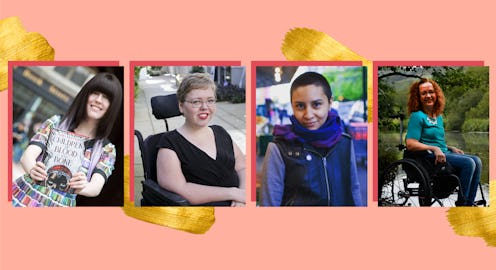Books
'Have Books, Will Travel' Is Meant To Challenge What You Think About Travel Memoirs

Even if you've never read a travel memoir in your life, you probably have a good idea of what this kind of book looks like: On a leap of faith, a person embarks on an adventure of a lifetime — maybe to Europe or Asia — after a major heartbreak or devastating job loss, in pursuit of wisdom and love and healing. Usually this person is white, able-bodied, neurotypical, straight, cis, and at least solidly middle class. Usually this person is traveling through lands with which they have little connection, ancestrally or otherwise. That's not to say that this is the only type of travel memoir that exists or that this type of narrative has no value, but it is to say that the genre could use a major revamp.
What if the travel memoir genre looked entirely different? What if we opened up space for people who are queer, disabled, neurodivergent, gender non-binary, and POC to tell their stories of travel? What if we focused as much on the people who live in these countries as we do on the tourists who visit? Over the next month, Bustle Books will be sharing the stories of writers who don't fit the mold of the "typical" travel writer and don't want to tell a "typical" travel story. These writers are challenging the privilege of who gets to travel and who gets to write about it.
In their essay "Travel Writing is Inherently Colonial — But I'm Writing a Memoir That's Different," Bani Amor writes: "Travel memoir is too often an exercise in flexing; it's a pissing contest for the privileged, which is no surprise given that it’s a genre established by wealthy white Westerners. As a reader of travel writing, it feels like watching a dinner party where white people tipsily exaggerate their adventures abroad to one another from the kitchen while the doors swing in my face."
Amor is far from the only writer who takes issue with the exclusivity of the genre. Kayla Whaley also writes about the tendency to focus on the person traveling instead of the place they are visiting, and how that can insidiously impact readers' conception of who gets to write these stories in the first place. In her essay "Travel Memoirs Are All About Immersive Experiences — But How Do You Write That When You're In A Wheelchair?," she poses a question: "The comparative dearth of travel memoirs written by disabled people might suggest publishing as an industry doesn’t believe they would. But isn’t the joy of travel writing as much about inhabiting another person’s experience as it is about inhabiting another place?"
Over the course of the next few weeks, Have Books, Will Travel asks you to consider a new generation of travel writers and a different kind of travel memoir. Are you ready for the leap of faith?